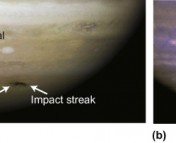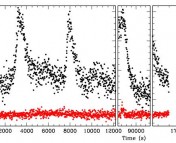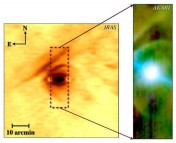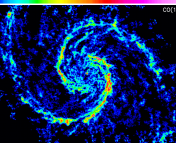As the holiday season approaches, many of us will find ourselves spending more time than usual with non-scientists. If you’re going home for the holidays, you’ll have your Aunt Sally and Uncle Bill to chat with at the dinner table about how your studies are going. Maybe you’ll be going to see your significant other’s family, and want to make a good impression on his or her Aunt Sally and Uncle Bill. Wherever you are, you’ll be finding yourself talking to people about science who usually think about different things.
As a graduate student studying astronomy, I often—surprisingly often—find myself explaining that astronomy does NOT entail any horoscopes. Really, none. I don’t even read my horoscope, nor do I know where Saturn was when I was born (though I could certainly figure it out if I wanted to).
Much like the recent study to understand perceptions of the words ‘astronomy’ and ‘astrophysics’, the authors of this study attempted to quantify the common misconceptions about the relationship between astronomy and astrology. They surveyed nearly 10,000 undergraduates at the University of Arizona over a 20-year period. Here’s what they found.
Students largely believe that astrology is scientific
The students were all were undergraduates at the University of Arizona, enrolled in an introductory astronomy class. They were asked a series of 21 knowledge-based questions and 24 questions about science, pseudoscience, and technology. Two questions were about astrology: “The positions of the planets have an influence on the events of everyday life” (answered on a five-point Likert scale) and “Would you say that astrology is very, sort of, or not at all scientific?” This set of questions allowed the researchers to quantify the students’ scientific literacy and gauge their beliefs about astrology.
Amazingly, only 22% answered that astrology is “not at all” scientific. Only 29% of students disagree or strongly disagree with the statement that planets affect everyday life. Interestingly, this is significantly less than the U.S. public as a whole: the NSF, using a survey with the same questions, has published results that say that 50% of the 18-24 year old demographic states that astrology is “not at all” scientific.
The more science classes students take, the less scientific they think astrology is.
Oh, good, education is working? While 17% of students who were taking their first science course said that astrology is “not at all” scientific, by the time they had completed 3 science courses, 32% said it was not scientific. That’s still only a third though: the rest believe it’s “sort of” or “very” scientific.
Just because a student believes astrology is scientific doesn’t mean they don’t know science.
The students who said that astrology is scientific only did 1 point worse (out of 15) on the science literacy test than the students who said that it was not scientific. Not too shabby, considering that on average, the students who answered “not at all scientific” had taken more science classes.
Takeaway message
One of the most interesting takeaways seems to be that pseudoscientific beliefs can coexist with general scientific literacy. That is, even if we manage to teach students how to draw a free-body diagram, they might still believe in other irrational things. While the belief in astrology seems harmless—it doesn’t really matter, ultimately, if people believe that they they will meet a handsome Taurus when Saturn rises—I think that instilling a concrete understanding of the difference between science and pseudoscience is incredibly important. Being a well-informed voting member of society requires us to make some decisions that involve science. I would very much like my fellow citizens to understand how to distinguish between science and pseudoscience, and draw their own conclusions about those issues. Perhaps we should think more about this when designing our own lesson plans, as TAs and later as professors.





I think I can understand why many scientifically educated people might agree that Astrology is “sort-of” scientific – they have been taught the scientific elements within the practice of astrology. Although the premise behind astrology is total bunkum, the fact remains that serious astrologers use many scientifically valid methods in the process of making their predictions. They need to understand the motions of the planets, in order to generate accurate epherimedes. They do so using methods developed by the likes of Brahe and Kepler, at a time when astronomy and astrology were still synonymous.
In other words, all serious astrological work relies on scientifically valid observations and calculations, even though the results of those calculations are applied in an unscientific way to produce horoscopes and other predictions.
@Allen:
Really? Could the public possibly believe that more than a tiny few self-styled astrologers actually do that — as opposed to, you know, consulting an almanac or website?
As someone more interested in psychology than astronomy, the cold reading skill of a real time astrologer does sometimes impress me a bit, though.
As a science major I know the difference between the two but still get the names mixed up.
I agree with Alf on this. If the question was literally “Would you say that astrology is very, sort of, or not at all scientific?”, then I’d disregard it. There’s too much potential for simply misunderstanding the question.